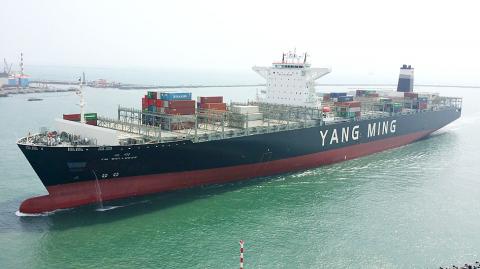Yang Ming Marine Transport Corp (陽明海運) yesterday inked a partnership agreement with Thailand’s Regional Container Lines Group aimed at pooling the companies’ resources to weather a persisting downturn in the sector.
Due to slowing growth in developed markets, the companies are hoping to further tap the Asian market, where growth has been more resilient.
The companies yesterday announced plans to expand bilateral cooperation on terminal operations in Taiwan and Thailand, slot exchange and vessel chartering services, as well as laden trucking and equipment interchange contracts.

Photo: Huang Chien-hua, Taipei Times
The agreement is to improve vessel utilization, reduce leasing and other operational costs, and expand coverage and quality of liner services, the companies said.
“We are expecting a tough year ahead, but market conditions should improve as oil prices begin to normalize,” Yang Ming Marine chairman Frank Lu (盧峰海) told reporters at a news conference.
“Earnings are likely to improve in the second half as commodity prices rebound and boost transport demand from producing nations,” Lu said.
Despite the downturn, he said that the company’s operations in Asia have remained profitable, backed by resilient demand among ASEAN countries, whereas conditions are much less favorable in long-haul lines to the US and Europe.
“Although recovery appears to be intact in the US market and Europe has stepped up quantitative easing measures to spur economic growth, we are not anticipating immediate improvement there,” he said.
Working with Yang Ming Marine, Regional Container Lines has reached a sizeable scale in Asia in recent years by growing its business in Thailand, using Singapore as an operational and transshipment center, Lu said.
“We have a long relationship through providing feeder services to complement Yang Ming Marine’s long-haul operations,” Regional Container Lines managing director and president Summate Tanthuwanit said.
Amid growing macroeconomic uncertainties across the globe, in particular softening demand in China, the marine transport sector has been weighed down by plummeting cargo volumes, suppressed shipping rates and oversupply, the companies said.
The Baltic Dry Index — which tracks the costs of transporting dry commodities including iron ore, cement, grain and fertilizer — last month dropped to 298, the lowest in the index’s three-decade history.
Yang Ming Marine reported that sales in the first two months of this year dropped 16.52 percent annually to NT$18.51 billion (US$563.13 million).
The company primarily provides domestic and overseas marine shipment services, warehouse, pier, tug boat, barge, container freight station and terminal operations, maintenance and repairs, among other businesses.
It operates various ship routes, including Asia-North America, North America-South America, Asia-Northwest Europe, Asia-Mediterranean, Asia-Black Sea and Intra-Asia.
Shares in Yang Ming yesterday closed up by 0.22 percent at NT$9.02, slower than the TAIEX’s 0.48 percent increase, Taiwan Stock Exchange data showed.

SEMICONDUCTORS: The German laser and plasma generator company will expand its local services as its specialized offerings support Taiwan’s semiconductor industries Trumpf SE + Co KG, a global leader in supplying laser technology and plasma generators used in chip production, is expanding its investments in Taiwan in an effort to deeply integrate into the global semiconductor supply chain in the pursuit of growth. The company, headquartered in Ditzingen, Germany, has invested significantly in a newly inaugurated regional technical center for plasma generators in Taoyuan, its latest expansion in Taiwan after being engaged in various industries for more than 25 years. The center, the first of its kind Trumpf built outside Germany, aims to serve customers from Taiwan, Japan, Southeast Asia and South Korea,

Gasoline and diesel prices at domestic fuel stations are to fall NT$0.2 per liter this week, down for a second consecutive week, CPC Corp, Taiwan (台灣中油) and Formosa Petrochemical Corp (台塑石化) announced yesterday. Effective today, gasoline prices at CPC and Formosa stations are to drop to NT$26.4, NT$27.9 and NT$29.9 per liter for 92, 95 and 98-octane unleaded gasoline respectively, the companies said in separate statements. The price of premium diesel is to fall to NT$24.8 per liter at CPC stations and NT$24.6 at Formosa pumps, they said. The price adjustments came even as international crude oil prices rose last week, as traders

SIZE MATTERS: TSMC started phasing out 8-inch wafer production last year, while Samsung is more aggressively retiring 8-inch capacity, TrendForce said Chipmakers are expected to raise prices of 8-inch wafers by up to 20 percent this year on concern over supply constraints as major contract chipmakers Taiwan Semiconductor Manufacturing Co (TSMC, 台積電) and Samsung Electronics Co gradually retire less advanced wafer capacity, TrendForce Corp (集邦科技) said yesterday. It is the first significant across-the-board price hike since a global semiconductor correction in 2023, the Taipei-based market researcher said in a report. Global 8-inch wafer capacity slid 0.3 percent year-on-year last year, although 8-inch wafer prices still hovered at relatively stable levels throughout the year, TrendForce said. The downward trend is expected to continue this year,

POWERING UP: PSUs for AI servers made up about 50% of Delta’s total server PSU revenue during the first three quarters of last year, the company said Power supply and electronic components maker Delta Electronics Inc (台達電) reported record-high revenue of NT$161.61 billion (US$5.11 billion) for last quarter and said it remains positive about this quarter. Last quarter’s figure was up 7.6 percent from the previous quarter and 41.51 percent higher than a year earlier, and largely in line with Yuanta Securities Investment Consulting Co’s (元大投顧) forecast of NT$160 billion. Delta’s annual revenue last year rose 31.76 percent year-on-year to NT$554.89 billion, also a record high for the company. Its strong performance reflected continued demand for high-performance power solutions and advanced liquid-cooling products used in artificial intelligence (AI) data centers,